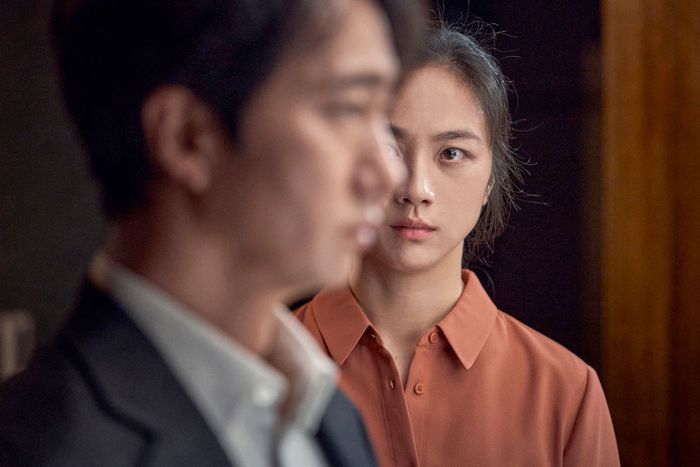
In general, it’s a good idea to discount anything a publicist tells you about a movie before you walk in. Everything is always “a return to form” or a “whole new level” or “his most personal project ever.” So when I ran into some PR guys I knew at JFK before our flight to Cannes, and they heralded Park Chan-wook’s new film, Decision to Leave, as his Hitchcock romance, I was inclined to brush it off. Sure. And Elvis is going to be Baz Luhrman’s Citizen Kane.
That is, until I actually watched Decision to Leave and spent the whole film chuckling at how Park, the Korean director behind Oldboy and The Handmaiden, had put a dozen Hitchcock movies in a blender, added a splash of his own visual ingenuity, and produced one of the most enjoyable films in this year’s competition. Maybe I was primed to view it through this lens, or maybe I just finished Donald Spoto’s Hitchcock biography and have turned into the guy from the Boss Baby meme, but I was seeing Hitch everywhere.
The plot feels like the kind that was elegantly sketched out on graph paper. An insomniac detective (Park Hae-il) is investigating the death of a local climbing enthusiast, who has perished, in somewhat predictable fashion, by falling from a great height. Was it an accident, a suicide, or murder? In the course of his investigation, the detective interviews the dead man’s Chinese widow (Tang Wei), and notices her bruises. A motive! He’s also struck by her soulfulness, the opposite of his own chipper, scientific wife. He makes her the prime suspect at the same time he falls for her, and it’s clear that for him, the two processes are essentially the same. When she discovers he’s been following her, she falls for him too.
Or does she?
You can have a lot of fun counting the Hitchcock influences here; I certainly did. There’s the divided loyalties of Notorious and North By Northwest, the voyeurism of Rear Window and Psycho, the shifting identities of Vertigo. The plot has a mirrored structure the late master would have admired. Halfway through, we jump forward a year, and everything doubles: two husbands and two deaths to go along with the two wives and two languages. There are two locations: the mountains and the sea, their own mirror images. And, as in Strangers on a Train, the detective and the widow are the film’s ultimate mirrors, the opposite and also the same. “The day your love ended,” one tells the other, “was the day mine began.”
At the film’s press conference on Tuesday, Park downplayed comparisons to Hitchcock and other influences. (The plot also resembles the 1961 Japanese film A Wife Confesses.) “A lot of journalists mentioned Vertigo,” he said. “I thought, Really? I listened to their explanations, and there are a number of similarities. But when I made this film, I wasn’t thinking of any other films in particular.”
Part of the reason critics are reaching for comparisons to titles from decades past is that Decision to Leave is a classical, restrained effort from the guy who gave us the squid scene in Oldboy and the lesbian acrobatics of The Handmaiden. At the press conference, Park was asked why this film lacked the outsize violence and shocking sex of his previous work. “If another director made this film, you wouldn’t have asked that question, so why are you asking me?” he said, taking mock offense. “I really wanted to make a film for adults. When I said that, everyone expected something erotic or sexy. So I did the exact opposite.”
Still, Park fans will appreciate that his visual verve remains. There are just some shots no one but Park Chan-wook can give you, a POV shot from the eye of a dead man and a mountaintop ascent scored to Mahler among them. And the director has not abandoned his love of aquatic creatures: Here there’s a subplot involving soft-shell turtles, which we’re told can cure depression in middle-aged men.
Consensus among the critics I’ve heard from is that Decision to Leave is a minor work, with The Guardian’s Charles Bramesco comparing it to pizza: Even when Park Chan-wook’s not at his best, he’s still really good. Arguments that the film is more exciting than engaging might hold water, but you know what? That’s what they said about Hitchcock.
More From the Cannes Film Festival
- How to Find Hope and Destroy It
- Charlbi Dean, Star of Palme d’Or Winner Triangle of Sadness, Dead at 32
- Freak Out! Over New Bowie Footage in Moonage Daydream


